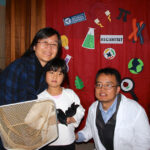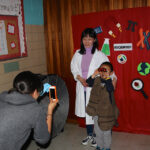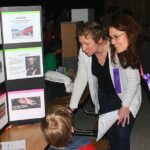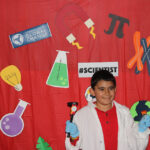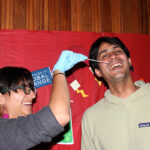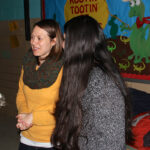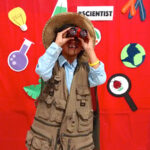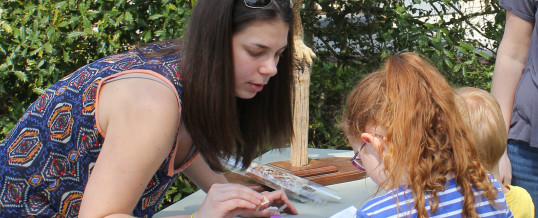[vc_row][vc_column][vc_column_text]
March 20, 2018
The Interfaces of Global Change Graduate Student Organization organized a workshop held last Friday, March 16, as part of a professional development activity and requirement for the IGC Graduate Program. The workshop for IGC Fellows included guest speaker, Antoine Michon, the current security council deputy coordinator for the French mission team at the United Nations in New York. Previously, Michon was the head of the environment division where he worked closely on the Paris agreement and with the Intergovernmental Panel on Climate Change (IPCC).
The second part of the workshop was also joined by Dr. Carol Franco, Senior Research Associate in Virginia Tech’s Department of Forest Resources and Environmental Conservation. Dr. Franco has provided technical support for the Dominican Republic’s delegation to international climate talks since the 2009 U.N. Climate Change Conference in Copenhagen and has been attending such meetings as a delegation member since the 2012 conference in Doha, Qatar. Dr. Franco is leading multiple efforts at Virginia Tech to secure funding for the development of an international climate change program, including a study abroad program addressing climate change and policy in the Dominican Republic.
The workshop began with a brief presentation by Michon about the Paris Agreement, followed by discussion focused on:
- Why an international agreement on climate, how it was achieved and what’s next?
- What does it mean for the US to opt out of the agreement?
- What are the actions taken by France?
Several reading materials were provided to IGC Fellows in advance to prepare them for the open discussion in the second part of the session, which centered around the questions:
- How can scientists better communicate and influence the public and policymakers?
- The negotiation process: how to reach consensus among 197 countries?
Kudos to the IGC GSO organizers for coordinating a great workshop experience!
The impact of the event is most effectively summarized through reflections shared by several IGC Fellow participants:
I really appreciated getting to hear a behind the scenes perspective on how the Paris Agreement came to be. It’s hard to conceptualize how so many countries’ scientists, negotiators, diplomats, and statesmen can come together to draft such important legislation from what you hear from news reports. Hearing directly from Antoine left me impressed not only with the event itself, but all of the leg work that the French organizers put into making everything come together. It was really a unique experience!
– Brandon Semel, IGC Fellow
[hr]
I took a course on climate change policy last semester taught by Dr. Carol Franco that centered around the history and future of the Paris Agreement and the annual UNFCCC Conference of the Parties, which was incredibly helpful in preparing me for this workshop. As an environmental diplomat for the host country (France), Antoine had a big part in planning and helping to mediate the Paris Agreement in 2015 and he provided some really interesting insight into all of the hard work that went into this.
I am interested in alternative career paths for biologists outside of academia and it’s clear that Antoine thoroughly enjoys his position as a diplomat. It was great to learn about the opportunities and challenges that he faces in that role. What stood out to me most from this experience was the human element of the negotiation process. As Antoine described late night debate sessions fueled by coffee and last minute resolutions reached during hallway huddles of the elite, I could sense the intensity and excitement that emanates from such environments and it made me want to experience it myself.
As scientists in training we generally try to operate in the realm of rationality and objectivity, but writing these policies involves so many conflicting requirements and values that they can’t be approached so simply. Taking part in these types of discussions with IGC helps me to realize this and to consider ways to overcome some of the obstacles that policy makers face.
– Kerry Gendreau, IGC Fellow
[hr]
Antoine gave us an insider’s perspective on the PCA negotiation; my favorite moments were when he joked about aspects of the diplomatic process, such as when he said that exhaustion of negotiators was part of the French presidency’s strategy, because people start to agree to things when they are tired, so that was why they held so many late-night back-channel meetings!
Antoine is very charismatic and came across as sincere. Interacting with him gave me a deeper understanding of how complicated policy-crafting is and why it may seem (to scientists) that it progresses so slowly. After this workshop, I have more trust in the negotiation process and better appreciation for what diplomats do – we may not get to a solution I like, or get to a solution very quickly, but I feel reassured that there are good people working very hard to enact global climate reform.
I was also relieved to learn that from Antoine’s perspective, the US saying it will pull out of the PCA had the opposite effect that some had feared: it actually spurred other countries to reaffirm their commitment to PCA and ratify the agreement quickly. The one exception might be Russia; Antoine wonders if part of the reason they have not ratified is because the US says it will back out.
– Mary Lofton, IGC GSO Vice President
[hr]
Antoine’s visit was extremely helpful, it was fascinating to hear about all the work that was behind the scenes leading 197 countries to come on board and accept an agreement on climate issues that held everyone accountable. In my opinion, many factors contributed to making the PCA successful, such as following the bottom-up approach versus the top-down, erasing the differentiation between the developed and underdeveloped countries and rather differentiate countries by their carbon dioxide emission rate, and lastly, treating countries equally and being fair to everyone. Overall, I learned many skills that I can implement as a scientist to become a successful honest broker in my field.
The presence of Dr. Carol Franco really helped us learn about the role of scientists in the negotiation process. I learned that we can be scientists and provide results that show the current status of the effect of the global change, and at the same time play a role in the negotiation process as well.
– Fadoua El Moustaid, IGC GSO Professional Development Committee Chair
[hr][/vc_column_text][/vc_column][/vc_row]

